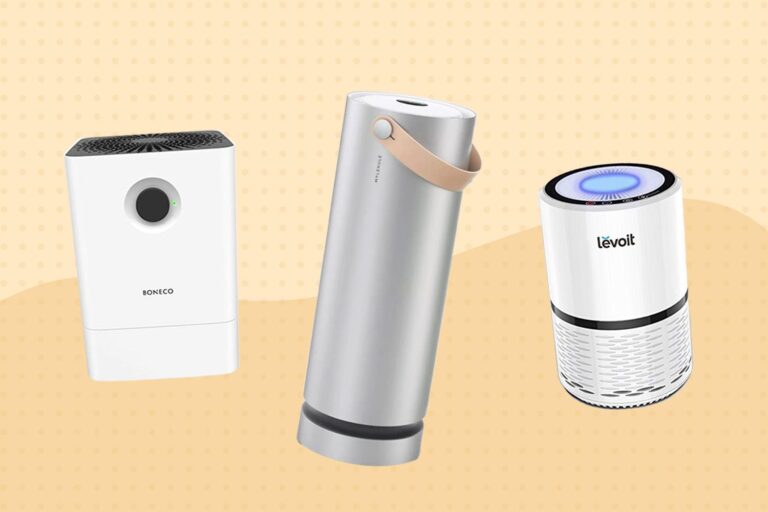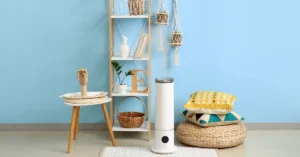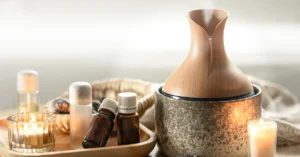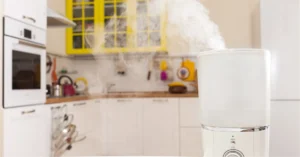An air purifier for your bedroom helps create a clean and relaxing sleep environment. It removes allergens and pollutants, promoting better sleep quality.
Are you tired of waking up congested or with irritated eyes? A small but powerful solution lies in the form of an air purifier for your bedroom. This device works silently in the background to remove airborne allergens such as dust, pollen, pet dander, and more.
By capturing these irritants, the air purifier helps reduce the potential triggers for allergies, respiratory problems, and other health issues. Additionally, it removes odors and VOCs, creating a fresh and clean atmosphere conducive to restful sleep. We will explore the benefits of incorporating an air purifier into your bedroom and provide some practical tips for selecting the best one for your needs.
Understanding Air Purifiers
To create a clean and relaxing sleep environment in your bedroom, one important appliance to consider is an air purifier. These devices are designed to filter and clean the air, removing pollutants, allergens, and odors, which can greatly improve the quality of the air you breathe while you sleep. Understanding air purifiers and their various features can help you make an informed decision when choosing the right one for your bedroom.
How Air Purifiers Work
Air purifiers work by drawing in air from the environment and passing it through a series of filters to remove impurities. The filters used in air purifiers are typically made up of multiple layers, each targeting specific types of contaminants.
The most common type of filter found in air purifiers is a High Efficiency Particulate Air (HEPA) filter. These filters are capable of trapping microscopic particles as small as 0.3 microns, including dust, pollen, pet dander, and some viruses. By capturing these pollutants, HEPA filters help to improve indoor air quality and reduce the risk of allergies and respiratory issues.
In addition to HEPA filters, some air purifiers also use activated carbon filters. These filters are effective at removing odors, smoke, and harmful substances like volatile organic compounds (VOCs) from the air. Activated carbon works by adsorbing these substances, trapping them within its porous structure.
Different Types Of Air Purifiers
There are several different types of air purifiers available on the market, each with its own unique features and benefits:
- HEPA air purifiers: These purifiers use HEPA filters to trap airborne particles and allergens. They are highly effective and suitable for most indoor environments.
- Activated carbon air purifiers: These purifiers excel at removing odors, smoke, and VOCs from the air, making them ideal for bedrooms with pets or smokers.
- UV air purifiers: These purifiers utilize ultraviolet (UV) light to kill bacteria and viruses, providing an additional layer of protection against airborne pathogens.
- Ionic air purifiers: These purifiers release negatively charged ions into the air, which attach to positively charged particles and cause them to fall to the ground, reducing their presence in the air you breathe.
- Ozone generators: These air purifiers produce ozone, a powerful oxidant that can eliminate strong odors and kill bacteria. However, ozone generators should be used with caution as high levels of ozone can be harmful to humans.
Key Features To Consider When Choosing An Air Purifier
When selecting an air purifier for your bedroom, there are a few key features to keep in mind:
- Room size: Consider the square footage of your bedroom to ensure that the purifier you choose is capable of effectively cleaning the air in the space.
- Clean air delivery rate (CADR): This value indicates how quickly the air purifier can clean the air in a room. Look for a purifier with a CADR that matches your room size for efficient purification.
- Noise level: If you are sensitive to noise while sleeping, opt for an air purifier with a low noise level to ensure a peaceful and uninterrupted sleep environment.
- Filter replacement: Check the cost and availability of replacement filters. Regularly replacing filters is necessary to maintain the effectiveness of the air purifier.
- Additional features: Some air purifiers come with features like air quality sensors, timers, and remote controls. Consider which additional features are important to you and align with your specific needs.
By understanding how air purifiers work, the different types available, and the key features to consider, you can choose an air purifier that is tailored to your bedroom’s needs, ensuring a clean and relaxing sleep environment.
Tips For Better Sleep Hygiene
When it comes to getting a good night’s sleep, there are several factors that can contribute to how well you rest. One important aspect of creating a clean and relaxing sleep environment is practicing good sleep hygiene. By following these tips, you can enhance the quality of your sleep and wake up feeling refreshed and rejuvenated.
Maintaining A Consistent Sleep Schedule
One of the most effective ways to improve your sleep hygiene is by maintaining a consistent sleep schedule. Try to go to bed and wake up at the same time every day, even on weekends. This helps regulate your body’s internal clock and promotes better sleep. Establishing a regular routine can signal to your brain that it’s time for rest, making it easier to fall asleep and wake up naturally.
Creating A Comfortable Sleep Environment
Your bedroom should be a sanctuary for sleep, free from distractions and discomfort. Here are some tips for creating a comfortable sleep environment:
- Keep your bedroom cool, quiet, and dark. Consider using blackout curtains or an eye mask to block out any unwanted light that can disrupt your sleep.
- Invest in a supportive mattress and pillows that suit your preferences. Finding the right level of firmness can make a significant difference in your comfort during sleep.
- Consider using an air purifier specifically designed for bedrooms to improve the air quality while you sleep. These devices can help remove allergens, pollutants, and odors, creating a cleaner and more relaxing sleep environment.
- Avoid using electronic devices such as smartphones, tablets, or laptops in bed. The blue light emitted by these devices can interfere with your natural sleep-wake cycle.
Other Practices To Improve Sleep Quality
In addition to maintaining a consistent sleep schedule and creating a comfortable sleep environment, there are other practices you can incorporate into your routine to improve your sleep quality:
- Establish a bedtime routine that includes relaxation techniques such as reading a book, taking a warm bath, or practicing mindfulness.
- Avoid consuming caffeine or alcohol close to bedtime, as these substances can disrupt your sleep patterns.
- Engage in regular exercise during the day, but avoid vigorous physical activity close to bedtime. Physical exertion can help promote more restful sleep.
- Keep a sleep diary to track your sleep patterns and identify any potential triggers or issues that may be interfering with your sleep.
- If you continue to struggle with sleep despite practicing good sleep hygiene, consider consulting a healthcare professional for further evaluation and guidance.
Improving Sleep With Additional Features
The quality of your sleep can greatly impact your overall well-being. If you’re constantly waking up feeling groggy and unrested, it may be time to consider investing in an air purifier for your bedroom. These devices not only help to remove allergens and pollutants from the air, but they also come with additional features that can enhance your sleep experience. In this article, we will explore some of the ways air purifiers can improve your sleep with their innovative features.
Air Purifiers With Built-in Sleep Modes And Timers
One of the key features to look for when choosing an air purifier for your bedroom is a built-in sleep mode or timer. These functions allow you to customize the operating schedule of your air purifier to ensure it runs quietly and efficiently while you sleep. With a sleep mode, the air purifier will work at a low fan speed, generating minimal noise that won’t disturb your slumber. This feature is especially beneficial for light sleepers or those with sleeping partners who are easily awakened.
Incorporating Aromatherapy With Essential Oils
To further enhance the sleep-inducing atmosphere in your bedroom, consider an air purifier that incorporates aromatherapy with essential oils. Many air purifiers now come with dedicated aromatherapy compartments or diffusers, allowing you to introduce soothing scents into your sleep environment. Lavender, chamomile, and other calming essential oils are well-known for their relaxation properties, promoting a deeper and more restful sleep. Simply add a few drops of your preferred essential oil to the designated compartment, and let the air purifier disperse the fragrance throughout the room, creating a cozy and tranquil sleep environment.
Integration Of Air Purifiers With Smart Home Technology
The integration of air purifiers with smart home technology takes your sleep experience to a whole new level of convenience. With smart home compatibility, you can control and monitor your air purifier using your smartphone or voice assistants like Amazon Alexa or Google Assistant. This means you can adjust the settings, turn on or off the device, and even set up a schedule all without leaving your bed. Smart home integration ensures that your air purifier seamlessly fits into your bedroom ecosystem, making it effortless to maintain a clean and allergen-free sleep environment.
Placement And Maintenance Of Air Purifiers
Air purifiers play a vital role in ensuring that you breathe in clean and fresh air while you sleep in your bedroom. However, to maximize their effectiveness, it is important to consider the ideal placement and proper maintenance of these devices. By strategically positioning your air purifier and following a regular cleaning and filter replacement routine, you can create a healthy and relaxing sleep environment. Let’s explore the best practices for both placement and maintenance of air purifiers to enhance the quality of your sleep.
Ideal Placement Of The Air Purifier In A Bedroom
When it comes to placing an air purifier in your bedroom, location is key. Consider these factors for optimal positioning:
- Avoid placing the air purifier near curtains or furniture that may obstruct its airflow. This ensures the unit can pull in air from all directions, maximizing its air cleaning capabilities.
- Place the air purifier at a distance from your bed. While it is tempting to position it right next to you for faster results, keeping it a few feet away enables the device to distribute clean air more evenly throughout the room.
- Strategically position the air purifier in an area with less traffic and away from potential sources of pollutants, such as windows or doors that open to busy streets. This helps the device work more efficiently by minimizing the amount of outside contaminants it needs to filter.
- Consider the size of your bedroom when selecting an appropriate air purifier. Larger rooms may require more powerful units or multiple purifiers to effectively clean the air.
Regular Cleaning And Filter Replacement
To maintain the optimal performance of your air purifier, regular cleaning and filter replacement are essential. Follow these guidelines:
- Refer to the manufacturer’s instructions for detailed cleaning guidelines. Typically, wiping the exterior and grilles with a damp cloth, and occasionally vacuuming the filters to remove accumulated dust, being careful not to damage them, will suffice.
- Inspect the filters regularly to determine when they need replacement. Depending on the model and usage, filters may require replacement every 3 to 6 months. Be sure to use genuine filters recommended by the manufacturer to maintain the unit’s effectiveness.
Setting Up A Maintenance Schedule
Establishing a maintenance schedule ensures that you never miss important maintenance tasks. Here’s a suggested schedule:
| Task | Frequency |
|---|---|
| Cleaning the exterior and grilles | Monthly |
| Vacuuming the filters | Bi-weekly |
| Filter replacement | Every 3 to 6 months |
By adhering to this maintenance schedule, you can ensure that your air purifier operates at its optimal level, providing you with cleaner air throughout the night.
Creating An Allergen-free Sleep Environment
Creating an allergen-free sleep environment is essential for a restful and rejuvenating night’s sleep. The bedroom should be a sanctuary that promotes relaxation and tranquility, free from common allergens that can disrupt sleep and cause discomfort. By implementing a few simple measures, such as using an air purifier, you can significantly reduce allergens in your bedroom and create a clean and healthy sleep environment.
Dealing With Common Allergens In The Bedroom
To create an allergen-free sleep environment, it’s crucial to address and eliminate common allergens that may be present in the bedroom. These allergens can include dust mites, pollen, and pet dander, which can trigger allergies and respiratory issues. Taking proactive steps to combat these allergens will promote better sleep and overall well-being.
Using Air Purifiers To Combat Dust Mites, Pollen, And Pet Dander
An air purifier is an effective tool for reducing common allergens in the bedroom. By filtering the air and trapping microscopic particles, such as dust mites, pollen, and pet dander, air purifiers create a cleaner and healthier sleep environment. When selecting an air purifier for your bedroom, look for one with a HEPA (High-Efficiency Particulate Air) filter, as it can capture up to 99.97% of airborne particles as small as 0.3 microns.
With an air purifier in your bedroom, you can rest assured knowing that the air you breathe while sleeping is of the highest quality and free from allergens. This can lead to a reduction in allergy symptoms, improved sleep quality, and a more energized start to your day.
Additional Measures To Reduce Allergens In The Bedroom
In addition to using an air purifier, there are other measures you can take to further reduce allergens in your bedroom:
- Regularly wash bedding, including sheets, pillowcases, and mattress covers, in hot water to eliminate dust mites and allergens.
- Vacuum and dust your bedroom regularly to remove accumulated dust and pet dander.
- Keep windows closed during peak pollen seasons to prevent pollen from entering your bedroom.
- Avoid using carpets and opt for hardwood or tiled floors, which are easier to clean and less likely to harbor allergens.
- Consider keeping pets out of the bedroom, as they can carry allergens on their fur.
By implementing these additional measures alongside an air purifier, you can create a bedroom that is truly allergen-free, promoting a restful and uninterrupted sleep.
Eliminating Odors For A Relaxing Sleep Atmosphere
When it comes to creating a clean and relaxing sleep environment, eliminating unpleasant odors is a must. Unwanted smells can disrupt your sleep and make it difficult to unwind at the end of a long day. That’s where air purifiers come in. These appliances are specially designed to remove odors and keep your bedroom smelling fresh, ensuring a restful night’s sleep.
Sources Of Unpleasant Odors In The Bedroom
Before we delve into how air purifiers can help eliminate odors, let’s first identify the sources of these unpleasant smells in your bedroom. Understanding the root cause of the problem will allow you to tackle it more effectively. Here are some common sources of odors in the bedroom:
- Dirty bedding and pillows: Over time, bedding and pillows can accumulate sweat, body oils, and dead skin cells, creating a musty odor.
- Pet dander: If you have furry friends sharing your bedroom, their dander can contribute to a lingering smell.
- Mold and mildew: Poor ventilation and moisture buildup can lead to the growth of mold and mildew, resulting in a damp and musty odor.
- Tobacco smoke: If you or someone in your household smokes, the smell can infiltrate the bedroom and linger on fabrics and surfaces.
Utilizing Air Purifiers To Remove Odors
Fortunately, air purifiers are a fantastic solution for combating these unwanted smells. These devices work by filtering the air and capturing odor-causing particles, leaving your bedroom smelling fresh and clean. Here’s how air purifiers can effectively remove odors:
- Trapping particles: Air purifiers use filters, such as activated carbon filters, to trap and absorb odor molecules. These filters are designed to capture even the tiniest particles, effectively removing the source of the smell.
- Neutralizing odors: Some air purifiers are equipped with additional features, such as ionizers or ozone generators, which actively neutralize odors by breaking down the molecular structure of the odor molecules.
- Circulating fresh air: By constantly circulating and filtering the air in your bedroom, air purifiers can help remove any stagnant or stale odors, leaving you with a clean and refreshing atmosphere.
Other Tips For Keeping Your Bedroom Smelling Fresh
While air purifiers are an excellent tool for eliminating odors, there are a few other steps you can take to ensure your bedroom smells fresh and inviting:
- Wash your bedding regularly: Make it a habit to wash your bedding, including pillowcases, sheets, and comforters, at least once a week to prevent any buildup of sweat and odors.
- Vacuum and dust regularly: Dust and dirt can contribute to unpleasant smells, so be sure to vacuum and dust your bedroom regularly to keep it clean and odor-free.
- Use natural odor absorbers: Enhance the freshness of your bedroom by placing natural odor absorbers, such as baking soda or vinegar, in strategic locations. These substances can help absorb and neutralize unwanted smells.
- Keep your bedroom well-ventilated: Proper airflow and ventilation are crucial for preventing the buildup of odors. Open your windows regularly to let fresh air in, or use a fan or air conditioner to keep the air circulating.
By implementing these tips and investing in an air purifier, you can ensure that your bedroom remains odor-free and conducive to a restful sleep. Say goodbye to unpleasant smells and hello to a clean and refreshing sleep environment!
Selecting The Right Air Purifier For Your Bedroom
When it comes to creating a clean and relaxing sleep environment, selecting the right air purifier for your bedroom is of utmost importance. Not only can it help improve the air quality in your sleeping space, but it can also contribute to a more restful and refreshing slumber. In this blog post, we will delve into the essential factors to consider when choosing an air purifier that is perfect for your bedroom. From assessing the size of your bedroom to noise level considerations and appropriate filtration technology, we will guide you through the process of finding the ideal air purifier for your sleep sanctuary.
Assessing The Size Of Your Bedroom
Before investing in an air purifier, it is crucial to assess the size of your bedroom. The dimensions of your room directly impact the efficiency of the air purifier and its ability to effectively clean the air. A general rule of thumb is to choose an air purifier that is capable of cleaning the air in your bedroom at least twice every hour.
To determine the appropriate air purifier size, consider the square footage of your room. Measure the length and width of your bedroom and multiply the numbers together to calculate the square footage. Once you have this figure, refer to the manufacturer’s recommendations or match it with the coverage area specified for each air purifier model under consideration.
Noise Level Considerations For A Peaceful Sleep Environment
In addition to ensuring clean air, noise level considerations are crucial for maintaining a peaceful sleep environment. A noisy air purifier can disrupt your sleep and create discomfort. Therefore, it is necessary to choose an air purifier that operates quietly.
When purchasing an air purifier, pay attention to the noise level specifications provided by the manufacturer. Look for decibel (dB) ratings to identify models that operate at lower noise levels. Air purifiers with noise levels below 50 dB are generally considered quiet and suitable for a bedroom environment. Keep in mind that some air purifiers offer specific “sleep” or “quiet” modes, which lower the noise level even further during bedtime hours.
Choosing A Purifier With Appropriate Filtration Technology
- HEPA Filtration: For the best air purification results, consider an air purifier with High-Efficiency Particulate Air (HEPA) filtration. HEPA filters are capable of capturing 99.97% of airborne particles as small as 0.3 microns, including dust, pollen, pet dander, and mold spores. This technology effectively filters out most common allergens, making it ideal for allergy sufferers.
- Activated Carbon Filters: To combat odors and eliminate volatile organic compounds (VOCs) from the air, look for an air purifier that includes activated carbon filters. These filters have the ability to absorb and trap odorous particles, such as smoke, cooking smells, and chemical fumes, leaving your bedroom smelling fresh and clean.
- UV-C Light: Some air purifiers utilize ultraviolet (UV) light technology to neutralize harmful bacteria, viruses, and germs. UV-C light with a wavelength of 254 nm has been proven effective in destroying the DNA structures of microorganisms, making it an excellent addition to air purifiers for enhanced germ control.
When selecting an air purifier, opt for models that offer a combination of these filtration technologies to ensure thorough and comprehensive air purification within your bedroom.

Credit: www.amazon.com
Importance Of Clean And Purified Air In The Bedroo
Impact Of Air Quality On Sleep Quality
The quality of the air we breathe has a direct impact on our overall health and well-being, especially when it comes to the quality of our sleep. Poor air quality in the bedroom can disrupt our sleep patterns, leaving us feeling groggy and tired throughout the day. In order to create a clean and relaxing sleep environment, it is important to understand the impact of air quality on sleep quality.
- Poor air quality can lead to an increase in respiratory problems, such as asthma and allergies, which can interfere with our ability to breathe properly while we sleep.
- Allergens, such as dust mites and pet dander, can also trigger allergic reactions that disrupt sleep and cause discomfort.
- Chemicals and pollutants present in the air can irritate the respiratory system, leading to coughing, wheezing, or difficulty breathing, all of which can disturb sleep.
- Inadequate ventilation and high humidity in the bedroom can create the perfect breeding ground for mold, which can worsen respiratory conditions and cause sleep disturbances.
Health Benefits Of Clean Air In The Bedroom
Creating a sleep environment with clean and purified air can offer numerous health benefits that contribute to a restful night’s sleep and overall well-being.
| Benefits of clean air in the bedroom: |
|---|
| Improved respiratory health |
| Reduced allergy symptoms |
| Decreased risk of respiratory infections |
| Enhanced relaxation and stress reduction |
| Improved sleep quality and duration |
By purifying the air in our bedrooms, we can breathe in cleaner and fresher air, and minimize the risk of respiratory problems. This leads to better sleep quality and deeper relaxation, allowing us to wake up feeling refreshed and rejuvenated.
- Improved respiratory health: Purified air helps to reduce the risk of respiratory issues, such as asthma and allergies, by removing airborne particles and allergens that can trigger symptoms.
- Reduced allergy symptoms: Clean air can alleviate allergy symptoms, such as sneezing, itching, and congestion, allowing for a more comfortable and uninterrupted sleep.
- Decreased risk of respiratory infections: Filtering out pollutants and pathogens from the air can help lower the chance of respiratory infections, promoting a healthier sleep environment.
- Enhanced relaxation and stress reduction: Breathing in clean air can promote relaxation and reduce stress levels, creating a calm and peaceful atmosphere that is conducive to quality sleep.
- Improved sleep quality and duration: By ensuring clean and purified air in the bedroom, we can improve the overall quality and duration of our sleep, leading to better physical and mental well-being.
Frequently Asked Questions(FAQ)
Do Air Purifiers Really Work For Bedroom?
Yes, air purifiers are effective for the bedroom. They remove pollutants from the air, creating a clean and healthy environment for better sleep. They eliminate dust, pet dander, allergens, and odors, improving indoor air quality and reducing the risk of respiratory issues.
Do Air Purifiers Help With Sleep Quality?
Air purifiers can improve sleep quality by removing allergens, pollutants, and odors from the air. They create a cleaner and healthier environment, leading to better sleep. Using an air purifier in your bedroom can reduce respiratory issues, allergies, and snoring, promoting a more restful sleep.
How Long Should You Run An Air Purifier In A Bedroom?
Run an air purifier in your bedroom for at least 8 hours to effectively clean the indoor air. It’s crucial to allow enough time for the air purifier to filter and circulate the air.
Will A Air Purifier Help With Smelly Bedrooms?
Yes, an air purifier can help eliminate odors in bedrooms by filtering out airborne particles that cause smells. It improves air quality, removes allergens, and freshens the room, creating a clean and odor-free environment for better sleep.
Conclusion
Creating a clean and relaxing sleep environment is crucial for better sleep quality. An air purifier for the bedroom can play a significant role in achieving this goal. By removing dust, allergens, and pollutants from the air, it helps minimize respiratory issues and promotes a healthier sleep atmosphere.
Investing in an air purifier ensures that you breathe in purified air, leading to a more restful and rejuvenating sleep experience. So, consider adding an air purifier to your bedroom to enhance your sleep environment and wake up feeling refreshed and energized.




